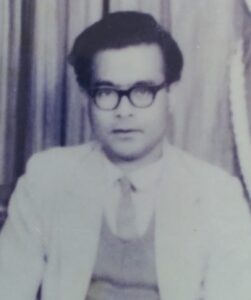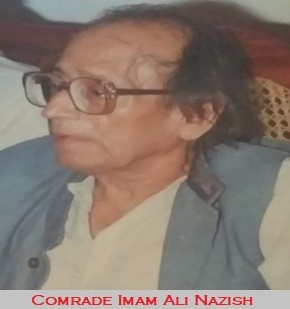Introduction

My self, Shahid Rizvi, full name Shahid Masih Rizvi, son of Syed Abid Masih Rizvi Al Mushahdi. (The mention of ‘Mashhad’ is due to my ancestors being bestowed with the title of ‘Masih’ in the field of medicine).I was born on December 31, 1933, in Lucknow, UP, India. I completed my BA from Karachi and have been associated with progressive left-wing movement since the age of 14. I have dedicated my entire life to this affiliation and still adhere to scientific socialism and communism.
Perhaps this will suffice to introduce myself.
The purpose of publishing this book is to acknowledge the value of its content and include it in the literary treasure trove.
Time will determine how it is received by the people.
A few words about my philosophy of life and poetry: I’m a proponent of the scientific theory of human creation. I consider humans to be the dynamic force of history and a power of the universe before whom the universe reveals it’s all its secrets.
The universe is in a constant state of flux, adopting new forms. Humans are just a few steps behind, moving forward. This theory of human and universe connection is the foundation of my intellectual thought process. The relationship between human and beauty of universe is unbreakable.
Human have rendered the universe more beautiful, and in doing so, have also elevated its own beauty. The Life, which emerged under the laws of nature, is being perpetuated and strengthened through human endeavor.
All human emotions and instincts are, in one way or another, manifestations of the creative force.
My poetic philosophy posits that poetry serves as a means of refining human cultural sensibilities, deepening the flow of consciousness between the universe and human, introducing humans to their own essence, beautifying and universalizing the sense of beauty.
I am deeply grateful to my daughter, Rana Rizvi, whose fortitude and support were instrumental in bringing this book to publication. Additionally, I extend my heartfelt thanks to all the friends whose encouragement played a vital role in this endeavor.
Shahid Rizvi
30/10/1996
(Translated by Muzamil Butt)
پیدا کہاں ہیں ایسے پراگندہ طبع لوگ

In the solitude of Ojha Sanatorium, where I have been teetering between life and death for the past two and a half years, the utterly unexpected and heart-wrenching news o comrade Shahid’s passing has shaken me to my core. I could never have imagined that someone as loyal as Shahid would depart without a word, without a final meeting, and that too, forever.
کیوں گئے تنہا اب رہو تنہا کوئی دن اور
It is still hard to believe that a lively, resilient communist like Shahid—who could turn every hardship and sorrow into laughter—would be so suddenly defeated by death.
پیدا کہاں ہیں ایسے پراگندہ طبع لوگ
افسوس! تم کو میر سے صحبت نہیں رہی
Yes, another revolutionary among the dreamers has departed from this world. Not long ago, the news of Comrade Iqbal Khan’s passing reached us, and now, it is our beloved comrade Shahid Rizvi. Shahid was one of those rebellious, love-driven spirits who devote their entire being to the pursuit of beauty and justice, who make the fight for truth and against the forces of oppression their unwavering creed. Such fearless, devoted revolutionaries are becoming rare—those who are ready to lay down everything for a cause, dedicating themselves with unshakable passion and conviction.
I first met Comrade Shahid in 1956 in Hyderabad, where I had been elected by the Communist Party of Karachi. Those were truly extraordinary times. In 1954, the Communist Party had already been declared illegal, and state repression was at its peak. The CID and other secret agencies relentlessly pursued us, yet despite all this, our comrades—the dreamers, the restless spirits—remained undeterred. Without fear or hesitation, they stood firm against the tyranny of the state, rising to every challenge it posed. They were fully committed, body and soul, to the struggle for a just and humane existence, to the cause of humanity, and to the liberation of the working class from the chains of oppression.
Despite the dire circumstances of that time, with the party’s financial state severely weakened and professional revolutionaries receiving meager wages, the passion and dedication of these comrades were at their peak. Their fervor for the struggle was unwavering. Day and night, they laughed in the face of the government agencies tactics, mocking every attempt to break their resolve, only to return to their work with renewed determination.
In those extraordinary times, Comrade Shahid Rizvi and Comrade Shamim Waasti were the lifeblood of the trade union movement in Hyderabad—two comrades, two companions, two inseparable friends. Shahid, with his slender build, striking features, and bright, sparkling eyes, always carried a smile on his lips. He had a quick wit, always ready with a joke, as if life’s hardships meant nothing to him. He was one of those who laughed in the face of adversity, dismissing challenges with a joke and moving forward. His sole focus, his unwavering devotion, was to the struggle for the liberation of the working class.
Shahid was an educated and intellectually aware young man. From the very first day we met, we became friends without any formalities. Shahid and Shamim had a deep bond with each other, both sharing a sharp sense of humor and wit. Since Shahid was more educated and insightful, there was a depth and elegance in his jokes and remarks. His humor carried a sense of wisdom, making every quip not just entertaining but thought-provoking as well.
He was never curt; even he had a remarkable ability to engage in conversation, seamlessly drawing out deeper discussions from every topic. The two comrades interacted with such synergy that people called them Yajoj-Majoj.
Comrade Shahid and his comrades were dedicated to the struggle day and night, even under the martial law of 1957. They worked tirelessly to organize workers in transport, textiles, and other factories. After a few years, Shahid took a leave to go to Khairpur and got married. For a while, our communication was interrupted, but he did not remain idle. Wherever he was, his connection with the party remained intact. Wherever, he was, his connection with the party remained intact. He did not sever ties with the party but maintained a constant relationship, continuing to collaborate with fellow activists, offering advice, and working diligently.
I must emphasis again that Shahid was a member of that tribe of passionate souls who dedicate themselves wholly to the pursuit of beauty and truth in life. They adopt the struggle against anti-life forces and the quest for beauty as their faith and ideal. Such fervent lovers are becoming increasingly rare. Today, as I look around, I find few comrades who have devoted their lives so completely to a cause with such unwavering dedication.
Today, after the collapse of the Soviet Union and the resulting confusion, many respected comrades and friends who were once leading the way have withdrawn and become uncertain, with their loyalties faltering. Despite various challenges, Comrade Shahid never lost his faith in socialism or his connection to the working-class struggle. Although encountered periods of difficulty, his dedication to the party and the cause remained strong, whether he was in prison or not. Through his poetry and writing, he continued the fight, proving himself a steadfast communist who fought for his cause through both his pen and his daily activism for the working class.
He was not only a trade union worker but also a columnist, essayist, and poet. Through his poetry, humorous and satirical essays, he waged a jihad of the pen. Shahid’s love for life’s beauty and the struggle of the working class was boundless. This was reflected in everything he did, especially in his poetry. He sought the beauty of life everywhere. Some may see this as his weakness, or perhaps his strength, for he had an immense love for children. Children were his soft spot because he believed they are our future. His poetry contains many beautiful poems about children.
Shahid had a compassionate heart that felt every injustice done to the people. Whether it was the struggle of the farmers of Pat Feeder or the laborers of Multan, he considered every struggle as his own, raising his voice through his writings. He never remained silent. Whether it was the farmers of Pat Feeder, the freedom fighters of Palestine, the conflict in Vietnam, or the martyrs of Multan, they were all his companions, his friends, his comrades. Wherever the people’s struggle was happening or continues today, Shahid wrote about it and joined his voice to their cause. He stood firm, participating equally in every battle through his pen and efforts.
Comrade Shahid also raised his children as committed communists. Alongside being a father, he made them comrades in the struggle. He prioritized the party and the cause of the working class. While many people attempt to shield their children and families from the struggles they face, Shahid never did so. He was a true communist, a true friend, and a true comrade.
Comrade Shahid was a deeply compassionate and rebellious soul. His heart ached at every act of injustice, every instance of violence, and every wrong inflicted upon the people. Wherever there was oppression or violence, he stood in protest, whether it was the case of Taranum Aziz or other acts of terrorism. Shahid had a particular disdain for crime, injustice, violence, and the politics of arms. Through his writing, he passionately opposed such injustices. His poems, such as Taranum Aziz and Ek Deewana Jo Mar Hi Gaya (A Madman Who Died), were filled with protest and profound pain.
Shahid had immense love for his comrades. To him, Comrades Hassan Nasir and Nazeer Abbasi symbolized rebellion, protest, and revolution. They were symbols of strength. He took pride in the fact that Hassan Nasir sacrificed his life but never abandoned his cause, and Nazeer Abbasi gave up his life but never bowed before oppression. This was the essence of Shahid’s poetry and ghazals. Anyone who reads his poems can sense his sincerity, his truth, and his belief in a better future for humanity, which is deeply reflected in his work. I am certain that those who read his poetry will be moved by his ideals. Through the publication of his works, his mission will live on.
Death may have taken away a beloved friend and a devoted communist from the party, but people like Shahid are far stronger than death. People like Comrade Shahid may appear to die, but they never truly perish. They remain in the hearts of their comrades, remembered through their writings and the actions they took for their cause. His bond with the party was profound, and he was instrumental in drafting the new constitution of the party, which was passed in the Congress. He was also called upon to defend it.
Shahid’s relationship with socialism was not one of blind faith; it was based on reason, logic, and science. He did not embrace socialism blindly, which is why the collapse of the Soviet Union did not affect him as much as it did those who treated it as a dogma. He understood that one model had fallen, but many more would emerge. He believed that socialism had not failed, but that mistakes had been punished. He was convinced that the crisis of capitalism would not diminish, but would continue to escalate, and he was witnessing this happen.
Shahid also believed that the forces scattered by this crisis would reorganize because the struggle of the working class, the class struggle, continues and will persist until a beautiful society emerges — one where everyone has equal rights, a society that can only be achieved through socialism and communism.
Imam Ali Nazish
Chairman,
Communist Mazdoor Kisan Party
(Translated by Muzamil Butt)


